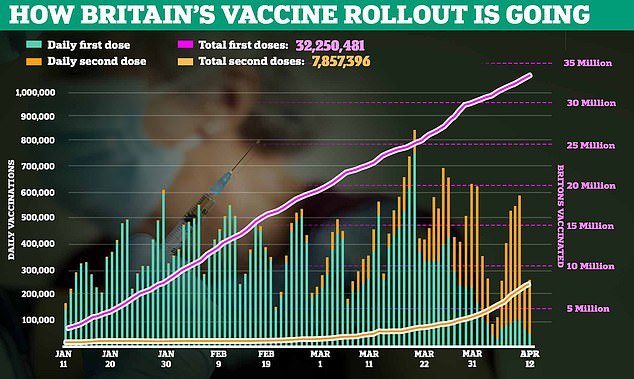
United Kingdom – CORONAVIRUS vaccines may be made compulsory for certain key workers if the want to keep their jobs.
Health Secretary Matt Hancock today appeared to confirm that the Government will try to make vaccination compulsory for those working in elderly care homes.
He said staff have a “duty of care” to get themselves vaccinated because elderly residents are the ones most at risk of dying from the virus.
Mr Hancock said industry bosses were united in their calls for a ‘no jab, no job’ policy, insisting good uptake was ‘our route out of this pandemic’, according to MaillOnline.
- He argued workers have a ‘duty of care’ because residents are Covid vulnerable
- Five week consultation will now take place to see if move is practical and ethical
- Critics argue plan could pave way for mandatory vaccines in other sectors
It comes as worried scientists claimed lifting could be put into reverse due to the “very concerning” South African variant.
A large cluster of the mutant strain has been reported in London, where residents have been urged to get a test immediately.
Prof Peter Openshaw, a member of a Sage group – the Covid-19 clinical information network – told BBC2’s Newsnight: “A lot of we scientists are very concerned about what’s happening at the moment.
“I think we’re all just hoping that the staged reduction in lockdown is going to be ok. It is being done reasonably cautiously but I think this is not good news.
“If we get rapid spread of the South African or other more resistant variants, it may well be that we are going to have to put the reductions of lockdown into reverse.”
It comes as new official figures revealed almost a quarter of registered Covid deaths were not actually caused by the virus.
Data from the Office for National Statistics shows 23 per cent of coronavirus fatalities are now people who have died “with” the virus rather than from an infection.
This means the disease was not the primary cause of death recorded on death certificates, despite the person who died testing positive for Covid.
Other data also shows an increasingly positive picture of the state of the pandemic in Britain.
Daily death figures by “date of death” reveal that Britain has had no more than 28 deaths a day since the beginning of April.

Hesitancy is thought to be high among care staff because many of them are from low income or less educated households or black or ethnic minority communities. All of those groups are known to be more likely to refuse a vaccine.
The five-week consultation will involve talking with industry leaders, staff and residents about whether the plan is practical and ethical.
It is believed workers who still refuse to get a jab will be redeployed to care homes for younger, less vulnerable residents.
But the Department of Health has not ruled out terminating contracts where moving them to another facility is not feasible
There are about 461,000 care home staff in England.
Martin Green, chief of Care England, said: ‘We have been really impressed how care providers have worked with their staff to listen to their concerns about the vaccine and this has had a very positive effect with a good take up.
‘The sector is divided on whether or not vaccination should be mandatory but it is wholly united in its support for the vaccine and has done everything it can to persuade its residents and staff to have it.
‘Should the vaccine be mandatory for adult social care staff it begs the question whether it should not be mandatory for the NHS too.’
Others raised concerns that people who have valid reasons not to take the jab would be discriminated against.
Kelly Andrews, organiser at the GMB workers’ union, said: ‘Mandating vaccination is an incredibly bad idea.
‘There will undoubtedly be care workers who cannot receive the vaccine due to health or pregnancy reasons, and they will be left outside of the scope of the scheme.’
She claimed many staff on zero hours contracts were refusing the vaccine because they feared missing out on shifts due to mild side effects.
She added: ‘This policy would be the thin end of the wedge and could lead to employers in other sectors demanding the same approach which would have profound consequences for human rights and employment rights.
‘The UK Government needs to get a grip after showing a complete failure to understand the real needs of the sector and its workers. They have been badly let down during this pandemic.’
Staff in care homes in the UK have been able to come forward for a vaccine since the programme launched in December.
They were considered one of the highest priority groups due to their interactions with elderly and frail residents, who are most likely to die from Covid.
Phil Booth, from the patient rights group MedConfidential, told MailOnline: ‘If the Government proposes to mandate vaccination only for care home workers, why does it not do so for other carers, or for healthcare workers who will similarly come into contact with the elderly and most vulnerable?
‘Or is that the plan, but Ministers aren’t telling us? Picking on one group and not another would seem to be driven more by politics and perception than by the science; the virus simply doesn’t care.
‘Far better that everyone is offered vaccination, and that we achieve herd immunity the ethical way – as we do with measles, mumps, rubella, and a host of other diseases – than to proceed down such a divisive, discriminatory, science-free path on the whim of a bunch of politicians who’ve clearly shown they’ve no interest in following the rules themselves.’
Other care bosses have backed controversial ‘no jab no job’ policies.
Pete Calveley, CEO of Barchester Healthcare, said the human rights of people living in care homes were at stake and staff must protect them.
The firm was one of the first to announce that it would not hire any new carers who haven’t been vaccinated and all existing staff must get a jab by the end of April.
Mr Calveley last month said the safety of his residents is a higher priority than people’s personal choice not to have a jab and that he hoped the government would make it the law.
He said the policy has only had a ‘tiny impact’ on the number of people accepting or applying for jobs and said some people had applied because they liked the rule.
NHS England statistics going up to April 4 show some 97,573 care home workers across the country are not vaccinated — more than a fifth of all staff.
Nearly half of care home workers have still not taken up the offer of a vaccine in parts of London, while more than nine in ten have had a jab in Blackpool.
The data shows uptake rates vary wildly across the country, with just 457 out of 886 eligible care home workers accepting a first jab in Lambeth — 51.6 per cent of staff.
For comparison, the highest rates in the country were seen in the Isles of Scilly (100 per cent), Blackpool (91 per cent), Shropshire (88.7 per cent), Plymouth (88.1 per cent) and Barnsley (87.8 per cent).
Source: The Sun and Daily Mail















